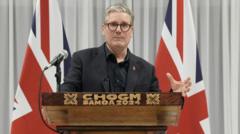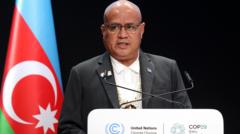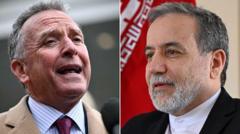In a significant development at the Commonwealth summit in Samoa, leaders from 56 nations, including UK Prime Minister Sir Keir Starmer, have reached a consensus that discussions surrounding reparatory justice for the transatlantic slave trade are now necessary. Escalating calls for reparations and apologies have put pressure on the UK even as it maintains its stance against financial compensation.
Commonwealth Leaders Initiate Reparations Discussion Amidst UK Hesitation

Commonwealth Leaders Initiate Reparations Discussion Amidst UK Hesitation
Commonwealth heads converge in Samoa to address reparations for the slave trade, as UK leaders wish to refrain from monetary commitments.
At a recent summit in Samoa, Commonwealth leaders convened to affirm the urgency of a dialogue concerning reparations for the transatlantic slave trade. Despite the UK's continued resistance to financial reparations—clearly articulated by Prime Minister Sir Keir Starmer—the consensus among heads of government points towards the necessity for a "meaningful, truthful and respectful conversation" on the subject.
Starmer emphasized that discussions during the meeting remained focused on resilience and climate issues, diminishing the prominence attributed to reparations, which constituted just a minor portion of the discussions. The UK government asserted that it would not shift its position regarding the payment of reparations, even as leaders from various nations expressed dissatisfaction with this firm stance.
The backdrop of this discussion includes previous remarks from UK leaders, which have been met with frustration from countries advocating for reparations. Discussions in the leaders' conclave, where Commonwealth prime ministers and presidents met without aides, extended over six hours, but Starmer insisted that reparations were not the primary topic of deliberation.
Foreign Minister Frederick Mitchell from the Bahamas expressed hope for substantial progress on reparations discussions at the upcoming UK-Caribbean forum scheduled in March, suggesting that the UK might ultimately be compelled to offer financial reparations in the future.
As the dialogue on reparations continues, it is likely to gain central importance in the agenda for the next Commonwealth summit, scheduled for two years hence. Calls for reparatory justice have already reached heights where a UN judge posited that the UK could owe upwards of £18 trillion for its involvement in slavery across 14 Caribbean nations.
While financial reparations remain contentious, alternative forms of reparations such as formal apologies, educational initiatives, and public health assistance have also emerged as potential avenues for reparatory justice. Incoming Commonwealth Secretary-General Shirley Ayorkor Botchwey has expressed a commitment to advance reparations discussions despite the challenges that lie ahead.




















